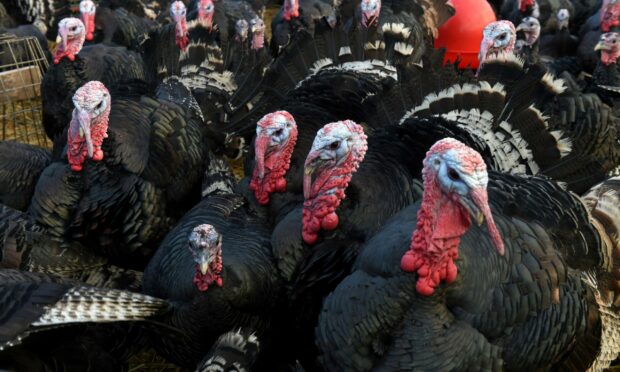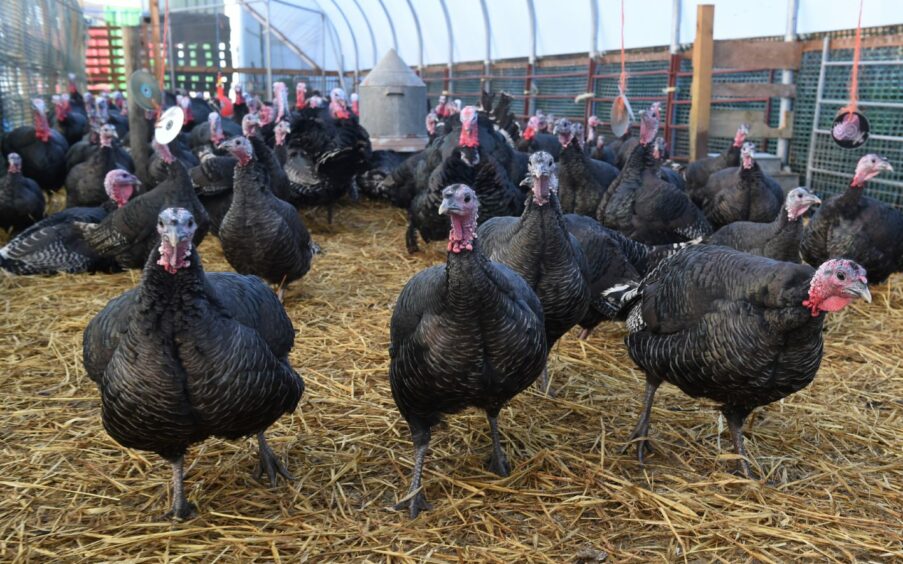Rest easy. Christmas is NOT cancelled.
Free-range turkeys will wing their way to dinner tables this festive season as north-east farmers avoid a devastating outbreak of bird flu that so far has led to the death of half of UK stocks.
The British Poultry Council on Tuesday said 600,000 out of 1.3 million free-range turkeys in the UK produced for Christmas have been culled or died because of bird flu.
Free-range turkeys are given more room to roam than other mass-produced birds and are usually more expensive.
Bird flu a ‘constant worry’ for turkey farmers
As the bird flu outbreak mainly affects England, north-east turkey farms appear to have emerged unscathed.
Three free-range turkey farmers in the region told The Press and Journal none of their birds has contracted bird flu.
All have taken precautionary measures against the virus including housing turkeys under cover.
Concerns still remain.
With some farmers not yet ‘processing’ their birds – the term used to describe slaughtering turkeys ahead of Christmas – they fear a virus outbreak could still cause last-minute havoc.
“It’s a constant worry,” says Becky Perry from Ledmacoy Turkeys in Strathdon. “There are (bird flu) cases in Aberdeenshire now which are about an hour away from us.”
Becky is referring to outbreaks at two Aberdeenshire chicken farms resulting in cull actions.
Thirty-two-thousand free-range chicken were scheduled for destruction at a farm near Turiff and 88,000 free-range hens at a farm near Banff, according to directives from Scotland’s chief veterinary officer sent out last month.
In response, Becky is taking extra care to protect her 300 free-range turkeys.
Precautions include putting the turkeys inside a polytunnel and setting up disinfecting posts for visitors.
‘We’re restricting people coming into our farm’
But as Ledmacoy’s turkey processing date edges closer, Becky has been driven mad by the actions of the general public, who continually ignore the farm’s large signs warning of ongoing biosecurity measures to combat bird flu.
“We’re restricting people coming into our farm, but if they do come in they need to disinfect their (car) wheels and feet,” says Becky, who explains that bird droppings containing avian flu can collect on car wheels where they can then transfer to shoes and boots.
“We have people that use our driveway as a turning area, and they just reverse in and then drive off. I’ve watched them from my kitchen window so I go out and try to… educate them about what bird flu is.”
Becky is now anxiously waiting for next Wednesday, when the processing of the turkeys will be over.
“From Wednesday, people can just turn around on my drive all they want and I won’t get mad at them,” Becky says with a laugh. “The turkeys will all be hanging in the fridge.”
An entire annual income on the line
Kirsty Williams, who owns Tullochbeg Turkeys near Aboyne, said her family-run business will be on tenterhooks until processing is completed in the next few days.
“If we had (bird flu) they would come in and cull all the birds,” she says. “And that would be our entire annual income from the turkeys.”
But Kirsty, who like many free-range farmers has raised her flock of 550 turkeys for the past six months from days-old chicks, adds that colleagues in Norfolk have had it much worse.
One farmer in the English country reportedly lost 10,000 turkeys in a cull earlier this year.
“It has just been horrific. If I lived down there, I would never have slept,” she says.
Risk of Christmas turkey shortages because of bird flu
Last month, Barra Bronzes farm owner Craig Michie warned that bird flu could lead to turkey shortages this Christmas and that he was concerned about his own flock.
On Wednesday, the Inverurie farmer confirmed he has started slaughtering his 3,300 turkeys in preparation for Christmas.
But he adds he’ll only be able to relax next Wednesday when the processing is complete and they are hanging in his fridge.
“The job won’t be finished by then,” he says. “But maybe I can have a little beer.”
On Wednesday, Scotland’s top vet told a rural affairs committee that about 10% of flocks are being voluntarily housed indoors over bird flu fears in Scotland.
Chief veterinary officer Sheila Voas said 224,000 birds have been culled in Scotland in the current outbreak – equal to 1.5% of the total population.
She added that problem is worse in England where the virus comes from birds migrating from Siberia and the Baltic States.
But UK farmers will be able to produce enough turkeys to feed the country this Christmas.
The chief vet said: “Turkey will be scarcer but I am not worried there won’t be any turkey this Christmas.”




Conversation